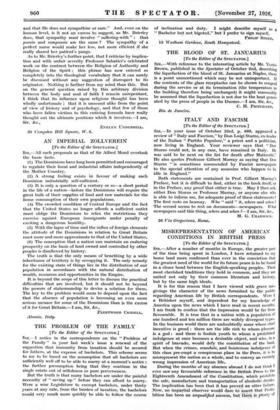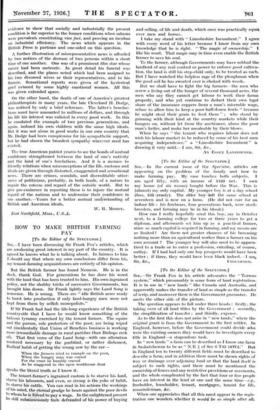MISREPRESENTATION OF AMERICAN CONDITIONS IN BRITISH PRESS
[To the Editor of the SPECTATOR.]
SIR,—After a number of months in Europe, the greater part of the time being spent in London, I have returned to my home land more confirmed than ever in the conviction that the greatest need of the world for its future peace is to be found in a closer bond between the English-speaking peoples. Their most cherished traditions they hold in common, and they arc united not only by their common literature and history, but by the same high ideals.
It is for this reason that I have viewed with grave mis- givings the character of the news furnidied to the public regarding American life by British correspondents. Were I a Britisher myself, and dependent for my knowledge of America upon the news which I have read in recent months, I am frank to confess that the impression would be far from favourable. It is true that in a nation with a, population of one hundred and ten million there are widely divergent types. In the business world there are undoubtedly some whose chief incentive is greed : there are the idle rich to whom pleasure is a god : and there is foolish youth to whom a prohibited indulgence at once becomes a desirable object, and who, in spirit of bravado, would defy the constitution of the land. But when the crimes, scandals, and boisterous indulgence of this class pre-empt a conspicuous place in the Press, it is to misrepresent the nation as a whole, and to convey an entirely wrong impression of American life.. During the months of my absence abroad I do not think I ever saw any favourable .reference in the British Press to the Eighteenth Amendment of the Consititution, which prohibits the sale, manufacture and transportation of alcoholic drinks. The implication has been that it has proved an utter failure. Now, no impartial Observer would dare to assert that Prohi- bition. iias been an unqualified success, but -there is Plenty of evidence to show that socially and industrially the present condition is far superior to the former conditions when saloons were prevalent, constituting vice foci, and proving an incubus on industrial efficiency. The news which appears in the British Press is partisan and one-sided on this question.
A further illustration of misrepresentative news is afforded by two notices of the decease of two persons within a short time of one another. One was of a prominent film star whose career had been meteoric. In great detail his funeral was described, and the places noted which had been assigned to his two divorced wives or their representatives, and to his fiancée. Sensational reports were given of the hysterical grief evinced by some highly emotional women. All this was given extended space.
On the other hand, the death of one of America's greatest philanthropists in many years, the late Cleveland H. Dodge, was noticed by only a brief reference. The latter's benefac- tions must have amounted to millions of dollars, and through Ills life his interest was enlisted in every good work. In this he emulated the example of two previous generations, and again, imbued his own children with the same high ideals. But it was not alone in good works in our own country that Mr. Dodge had been conspicuous for his sympathetic support, but he had shown the broadest sympathy wherever need has existed.
The true American patriot yearns to see the bonds of mutual confidence strengthened between the land of one's nativity and the land of one's forefathers. And it is a menace to friendly relations when misconceptions of the life, customs and ideals are given through distorted, exaggerated and sensational news. There are crimes, scandals, and discreditable utter- ances of politicians, probably, in both lands, of a nature to impair the esteem and regard of the outside world. But to give pre-eminence in reporting these is to injure the mutual regard of the nations and to undermine their4confidence in one another.—Yours for a better mutual understanding of British and American ideals, W. H. MOODY. East Northfield, Mass., U.S.A.



















































 Previous page
Previous page